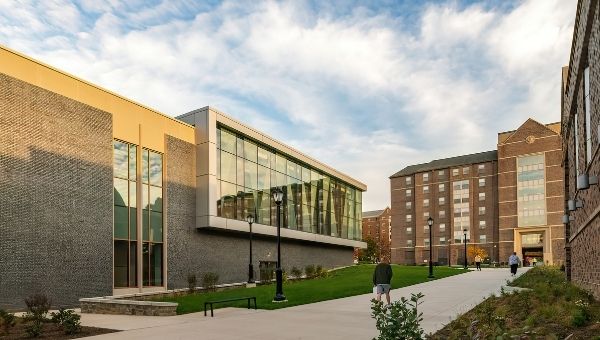CELEBRATE WCU’S SESQUICENTENNIAL WITH MORE PROGRAMS IN THE MUSEUM’S LIVE ZOOM LECTURE SERIES
 When it opened in 1871, the West Chester Normal School was a single building that
provided housing for both professors and students and contained classrooms, labs,
library, and dining hall — a complete residential educational institution under one
roof. A number of colleges established in the 19th century featured a similar arrangement.
When it opened in 1871, the West Chester Normal School was a single building that
provided housing for both professors and students and contained classrooms, labs,
library, and dining hall — a complete residential educational institution under one
roof. A number of colleges established in the 19th century featured a similar arrangement.
Today, the West Chester University campus encompasses 80 academic, student housing, and student support buildings, plus ancillary buildings, athletic fields, and open space across 406 acres.
How some of WCU’s major buildings came to be is the subject of the next free Zoom program in WCU’s 150th Exhibition Lecture and Tour Series on Wednesday, January 12, at 7 p.m. Anne Krulikowski, associate professor of history, will examine the evolution of our institution through the growth of WCU’s physical campus. Series host Michael A. Di Giovine, director of WCU’s Anthropology and Archaeology Museum and associate professor of anthropology and sociology, will also highlight architectural artifacts in the museum’s sesquicentennial exhibit WCU 150: History and Heritage, which is located on the first floor of Francis Harvey Green Library.
Krulikowski is also the author of the University’s sesquicentennial history We Serve: West Chester University, 1871-2021. Visit WCU's sesquicentennial website in February for more information about this commemorative book.
The virtual sesquicentennial lecture and tour series, which began in November, is a partnership between the museum and the WCU Alumni Association. Jenna Birch, Director of Alumni Engagement, notes, “The series has been instrumental in connecting our alumni, faculty, staff, and students. While our University’s history is well documented in multiple publications, this is the first-ever oral history presentation focused on our institution’s evolution from its earliest days of developing educators to where we are today preparing students to excel in traditional and emerging industries.”
Approximately one hour each, these free, live programs are hosted by Di Giovine and student co-curators from his museum studies courses. They include a brief tour of the sesquicentennial exhibition that highlights elements topical to the guest speaker’s subject. Unless otherwise noted, all programs begin at 7 p.m. Register here or click the links next to the titles below. Recordings of previous programs are available here.
Wednesday, January 12

The History of Architectural Styles at WCU | REGISTER »
The WCU campus was established with one building, but has evolved into a complex of structures in a variety of architectural styles that reflect the changing needs and tastes of our community. The growth of the physical campus mirrors our evolution from Normal School to University, the expansion of our curriculum, and the increasing variety of student activities. Explore our collection of architectural artifacts with Di Giovine, then learn about the physical development of campus with Anne Krulikowski, associate professor of history and author of the sesquicentennial history We Serve: West Chester University, 1871-2021.
Thursday, January 18
The History of Diversity, Equity, and Inclusion with Larry Dowdy ’73, M’80 | REGISTER »
Diversity, equity, and inclusion is an integral pillar of WCU, as it aids in recruitment and retention and contributes to a vibrant campus culture. Yet there were many hurdles to overcome in our institution’s 150-year history. Join Di Giovine and student co-curator Aaron Stoyack as they talk with Lawrence A. Dowdy, former Executive Deputy to the President, in a discussion of how WCU righted historical injustices. A number of artifacts will be highlighted and stories of African American alumni shared. Dowdy will explain that, in spite of being denied on-campus housing, dining room privileges, and other opportunities during the early and mid-20th century, African American alumni were triumphant. He attributes their success to their high-quality campus education and the bonds formed with their classmates.
Wednesday, February 2
WCU’s History in the Innovation and Education of Wellness Professionals | REGISTER »
The health sciences have played a central role at our institution since our early days. Today, the College of Health Sciences boast a number of baccalaureate and graduate degree programs that train our students to be successful healthcare professionals. Di Giovine highlights prized artifacts in the exhibition that reflect the importance of health sciences education to our institution. College of Health Sciences Dean Scott Heinerichs then leads an exclusive tour of the University’s state-of-the-art Immersive Learning Center in the new Sciences & Engineering Center and The Commons, showcasing the cutting-edge learning environments we provide our students to ensure they are prepared to be successful in their future careers.
Upcoming Programs
Visit the sesquicentennial website often for updates to the programs below.
3/3/2022 History of Charter Day
3/22/2022 Student Life at WCU
3/30/2022 Walking Tour with John Baker
4/5/2022 Military History
4/19/2022 Sustainability at WCU
Previous Recordings
Making of the Exhibit and Special Collections | Watch the recording now! University Libraries Special Collections holds many unique treasures, including hundreds of rare and culturally significant items. It also maintains a rich and ever-growing collection of items documenting the university's 150-year history. Many of these are in our sesquicentennial exhibition, WCU 150: History and Heritage. Librarian Ron McColl opens the Special Collections vault to show some of the rarest and most valuable pieces in the collection and discuss his process of caring for these important artifacts.
A Look at WCU’s Historic Music Program | Watch the recording now! Music has always been integral to our students’ academics and extracurriculars, notes student co-curator Kat Godfrey. This year, the Wells School of Music celebrated the 100th anniversary of the holiday concert, and Dean Christopher Hanning and Holiday Program Director Ryan Kelly review a century of holiday music from Asplundh Concert Hall. Enjoy stories from alumni and examine our famed 1926 Skinner Organ. Did you know that one of the first people to play the Skinner Organ in Asplundh Hall was renowned composer and West Chester resident Samuel Barber?
A Conversation with Director of Athletics Terry Beattie | Watch the recording now! Shortly after our founding, baseball was introduced as the first known sport at West Chester, leading to a long and storied history of athletics at WCU. Since 1899, West Chester has captured 18 team National Championships, and 159 PSAC Championships. But wins and losses are not the only way WCU athletics measures success. After an in-depth look at our athletic legacy with student co-curators Aaron Stoyack and Sadie Patterson, Director of Athletics Terry Beattie and Di Giovine discuss the past, present, and future of WCU athletics and how success in the classroom and in the community fuels success in competition.
